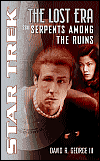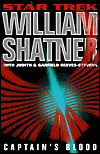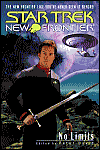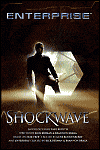Boarding the Enterprise, edited by David Gerrold, Robert Sawyer
Book Review by Heather Hunt
Have you read this book?
Boarding the Enterprise presents Exhibit A in not judging a book by its cover, or at least by its clarifying material. From the prominent banner across the top border that declares this book to be "Completely Unauthorized" (I wonder how something could be "partly authorized?"), I expected an amateurish collection of drooling fan pieces. Quite the contrary, as I'll soon enumerate, which leads me to believe that the authorization process much just involve too much paperwork and red tape, because I don't honestly see whyTPTB (the powers that be) would not want to authorize such a thorough and well-written series of essays chronicling Star Trek: The Original Series' (ST) impact across our culture.
I consider myself a casual ST fan, with the original series and Voyager being my favorite iterations of the ST universe. In other words, I'm not a Trekkie, so for me these essays provide a mini-history and reference collection of ST, its network and viewing slots, letter-writing campaigns that saved it for a time, and the syndication that resurrected it - seemingly for all time. For example, D. C.Fontana's essay is a series of behind-the-scenes anecdotes, which may be repetitive for die-hard Trekkies, but I hadn't heard them before.
But as an omnibus gathering of ST's impact on politics, media, science, television, philosophy, conventions, fan fic, and more, you can't beat this grouping of well-written and entertaining essays. In particular, Don DeBrandt's "What Have You Done with Spock's Brain?" is laugh-out-loud hilarious while making a logical case for how illogical it is to be so committed to being logical. Continue the guffaws with Lawrence Watt-Evans essay on safety precautions - or the lack thereof - on the Enterprise in "LostSecrets of PreWar Human Technology."
You've also got to go along with engineer Robert A Metzger's impassioned argument that Chief Engineer Scotty is the most important crew member on the Enterprise. Also noteworthy are David DeGraff's memoir about what ST teaches, the good and the bad, whilst still inspiring vocational paths for young watchers, and Adam Roberts' well-argued position that ST actually killed the Space Race by presenting an ideal picture of space travel that contrasted too vividly with the boring and mundane current state of spacecraft as to make the public lose interest in the real thing.
Melissa Dickinson analyzes the phenomenon of fan fiction and ST's creation of this whole new genre back in the sixties, and Paul Levinson declares that ST liberated television from the three-network hegemony way back in the seventies.
The weak essay for me was "The Prime Question" by lawyer and author Erik Greene, whose main point that the Prime Directive is really the Prime Question of whether a Superpower should get involved in the local affairs of other cultures or civilizations, isvaild, but whose writing is pedantic and sounds like a lecture. On the other hand, Michael Burstein's overview of religion in ST called "We Find the One Quite Adequate" is succinct, to the point, well-outlined and focused.
I recommend this book to any fans of Star Trek, the Original Series. Some of it may be repetitive for some fans, but to have all these essays in one place is a convenient celebration of this groundbreaking series.
I consider myself a casual ST fan, with the original series and Voyager being my favorite iterations of the ST universe. In other words, I'm not a Trekkie, so for me these essays provide a mini-history and reference collection of ST, its network and viewing slots, letter-writing campaigns that saved it for a time, and the syndication that resurrected it - seemingly for all time. For example, D. C.Fontana's essay is a series of behind-the-scenes anecdotes, which may be repetitive for die-hard Trekkies, but I hadn't heard them before.
But as an omnibus gathering of ST's impact on politics, media, science, television, philosophy, conventions, fan fic, and more, you can't beat this grouping of well-written and entertaining essays. In particular, Don DeBrandt's "What Have You Done with Spock's Brain?" is laugh-out-loud hilarious while making a logical case for how illogical it is to be so committed to being logical. Continue the guffaws with Lawrence Watt-Evans essay on safety precautions - or the lack thereof - on the Enterprise in "LostSecrets of PreWar Human Technology."
You've also got to go along with engineer Robert A Metzger's impassioned argument that Chief Engineer Scotty is the most important crew member on the Enterprise. Also noteworthy are David DeGraff's memoir about what ST teaches, the good and the bad, whilst still inspiring vocational paths for young watchers, and Adam Roberts' well-argued position that ST actually killed the Space Race by presenting an ideal picture of space travel that contrasted too vividly with the boring and mundane current state of spacecraft as to make the public lose interest in the real thing.
Melissa Dickinson analyzes the phenomenon of fan fiction and ST's creation of this whole new genre back in the sixties, and Paul Levinson declares that ST liberated television from the three-network hegemony way back in the seventies.
The weak essay for me was "The Prime Question" by lawyer and author Erik Greene, whose main point that the Prime Directive is really the Prime Question of whether a Superpower should get involved in the local affairs of other cultures or civilizations, isvaild, but whose writing is pedantic and sounds like a lecture. On the other hand, Michael Burstein's overview of religion in ST called "We Find the One Quite Adequate" is succinct, to the point, well-outlined and focused.
I recommend this book to any fans of Star Trek, the Original Series. Some of it may be repetitive for some fans, but to have all these essays in one place is a convenient celebration of this groundbreaking series.
|
Click here to buy Boarding the Enterprise, edited by David Gerrold, Robert Sawyer on Amazon
|
Boarding the Enterprise, edited by David Gerrold, Robert Sawyer on Amazon
| More Books You Might Like |
Comment on Boarding the Enterprise, edited by David Gerrold, Robert Sawyer
| Comments on Boarding the Enterprise, edited by David Gerrold, Robert Sawyer |
| There are no comments on this book. |




